- Home
- Christine Pope
All Fall Down Page 18
All Fall Down Read online
Page 18
“It will be done, Mistress Merys. I will also have extra food and blankets brought out. And a pallet, so that you need not sleep on the floor.”
I thanked him, and he left. At once I returned to the sick boy, who had fallen into a light, feverish doze. Carefully I lifted his tunic so I could once more inspect the swelling at his groin. It was a smallish lump, not quite the size of an egg, with angry red edges. From what I could recall of my studies, lancing the bubo only seemed to be successful when it was further advanced, and more of the sickness had centered in the infected node. I had no idea how long that would take, but it was clear I would be performing no surgeries on the boy tonight.
“He is resting,” I told Wilys and the watching stableboys. “And we should all rest, too. How do you feel? Any lightheadedness, fever?”
They all shook their heads, but I knew better than to be relieved. The disease would do as it willed. Just because they hadn’t presented any symptoms yet didn’t mean that they wouldn’t wake up delirious and shaking the next morning, or the next night.
And there was no guarantee the same wouldn’t happen to me as well. What they would do if I fell ill, I didn’t want to contemplate. Then again, even if the plague had already invaded my body and begun to take hold, I should still have a few days where I could be useful. In the meantime, I would take what measures I could.
After lifting up my woolen outer skirt, I reached down and began tearing strips from the hem of my chemise and one of my petticoats. Wilys looked on, somewhat aghast, as the stableboys laughed nervously. One of them even had a ridiculous glint in his eyes at the sight of my exposed ankles.
“Oh, for goodness’ sake,” I snapped, and thrust one of the strips at the young man in question. “Tie that over your mouth. All of you,” I added, as I handed a piece of linen to each of them. “Like so.” And I demonstrated by tying the strip over my mouth and nose.
“What good is this going to do?” the one stableboy who had been caught kissing Irinna asked.
“None of you are coughing yet,” I replied, my words somewhat muffled by the linen strip. “That means the contagion is not in your lungs, and therefore isn’t in the air. By covering our mouths and noses, we can keep the infection from entering our air passages.”
They shot dubious looks at one another, and at me, but no one seemed inclined to argue when I was offering them a shred of hope, even if it was flimsier than the linen which covered the lower halves of our faces.
I heard another knock at the door, followed by Lord Shaine’s voice. “Merys?”
Something within me seemed to turn over at the sound of that warm baritone, but I knew I must maintain my composure. I was a physician of the Golden Palm, not a lovesick girl. Lifting my chin, I made my way to the door, and once again opened it the barest crack. “My lord,” I said formally.
I could see nothing of him save a slight glint of his eyes in the reflection from the lantern inside the lean-to. “Is what Ourrel says true?”
“I fear it is. But as of now only one of the stableboys is ill, and rest assured I will do everything I can for him—and to make sure none of the others here catch ill.”
His voice was rough. “And what of you?”
“I fear I am exposed as well, and so must endure here for a while. But remember, I survived Lord Arnad’s estate, so I am sure I will make it through this as well. I cannot take a chance by returning to the keep, however. You understand.”
“I don’t understand a thing,” he said, and it was clear he made no attempt to hide the bitterness in his voice. “How could this have happened, after all the precautions we—you, that is—took?”
“I fear I have no answer for that, my lord.” Indeed, it was a question that still gnawed at me. Truly the plague was an evil thing, to have so neatly circumvented all the safeguards I had put in place. But I had no time to inveigh at the gods, or my own clumsiness. “If I have learned one thing in this life, it is that railing against what might have been does me very little good. Only tell me that you will manage the quarantine, and that I will have all the supplies here that I have requested.”
“Whatever you need, Merys,” he said at once. “That is the least I can do for you. But if it spreads—”
“Then the quarantine will be set aside, of course.” I tried to ignore the traitor part of me that whispered if such a terrible thing were to come to pass, at least I would be free to see Lord Shaine, to have more of him than a disembodied voice outside a door. “But we must hope that never happens. In the meantime, please follow my precautions. Make sure everyone stays in their rooms as much as possible, and have everyone cover their mouths and noses like so.” I cracked the door open just the tiniest bit more so he could see the fabric I had tied over the lower half of my face.
“I will make certain of it.”
Oh, how I wished to fling open the door so I might have him hold me, feel the comfort of his strength, even though I knew that strength would be of little use against an enemy as evil as the plague. Somehow I retained enough control of my wits to stifle the mad impulse. Instead I said, “You should go, my lord. We know the plague is here, but we cannot say that about the rest of the stronghold. You must return to where it is safer.”
He was quiet for a moment, then said, “I fear you are right. But tell me—you will be well. Promise me.”
“I promise,” I said immediately, even though I knew such a promise was a foolish and empty one. Even I couldn’t guarantee my safety.
But that seemed to be enough for him. “Take care, Merys,” he told me, and then he was gone.
I closed the door but lingered there, one hand still resting on the door latch. Somehow I did not want to turn around. For once I did so, I would be confronting the reality of my situation—the sick boy on his bed, the other young men who had placed their all too fragile lives in my hands. I took in one breath, and another. My lungs were clear, the air seeping in around the door frame cold and clean. I was alive, and so was everyone else. For now.
Then I turned, and began to explain what we all needed to do.
Because none of the others had yet showed signs of contagion, I had them move out into the stables proper. Luckily the straw-filled mattresses on their bunks were light and easy enough to move. There was some grumbling about having to bed down with the horses, but I pointed out that the horses would actually help them to stay warm, and that I doubted very much whether they wanted to be in the same room when it did come time for me to lance the plague boil. After that they picked up their belongings and moved away with some alacrity, and, despite the situation, I saw a quick grin flit across Wilys’ mouth before he sobered once again.
Some time after that Ourrel had several of the household slaves leave a veritable mountain of supplies outside the door—a pallet for me, bread and fruit and several meat pies, flagons of hard cider and buckets of water, piles of fresh linens and sheets and blankets. Moving everything inside took some time, and for that I was glad. I could concentrate on storing the supplies and setting up my pallet on the floor next to the sick boy’s bed, even though Wilys tried to persuade me to take the bunk across from the plague-stricken stablehand.
“It is probably safer on the floor,” I pointed out. “After all, I have no way of knowing whether the infection has touched that bunk. Not to say that a floor is the cleanest place in the world, but at least it is not someplace where someone has been sleeping.”
He could make no argument against that, and finally disappeared into his own room, which was located at the far end of the stables. Most likely he was the safest of all of us, since he had slept apart from the boys in his charge. I had no way of knowing for sure, of course. The plague had already shown itself to be a most capricious disease, and it was entirely possible that all of my careful precautions would be for naught. Still, I had to try. If nothing else, following all the rules I had been taught to prevent contagion gave me some sense of security. The collected wisdom of those who had gone before me must count for
something.
But none of them had fought the plague, my mind whispered, as I lay down on the pallet and tried to will myself to sleep.
True, the Order had been founded many years after the last outbreak had ravaged the continent, but that fact couldn’t discredit their wisdom, nor the fact that many different diseases could be treated with the same sorts of medications and methods. And at least I could make this fight here, where I knew I had adequate supplies. Had I not spent most of the autumn gathering and concocting medicines to fight the various ailments I knew always descended with the onset of winter? A fever was a fever, after all, whether brought on by influenza or plague.
If not precisely comforted, I did feel somewhat calmer after I had assessed the situation. Besides, I would be of no good to anyone if I allowed myself to be overwrought and deprived of sleep. I shut my eyes and pulled the blankets more closely about me, and drifted into blackness.
The dream was upon me once again. Once more I dug through the midden behind the kitchen door; once again dirt blackened my fingers and nails as I flung carrot tops and peelings aside. Something pale caught my eye, and I seized on it, only to see it was merely a clump of poisonous mushrooms. Tears stinging my eyes, I continued to paw through the mess, my breath coming short with fear and desperation. And then I froze, for I heard a keening cry, a sound so unearthly I thought it must have come from the throat of some wild animal.
It came again, and I sat up in my pallet, clutching the blankets to my breast. For a second or two I could not think where I was, and then I realized I lay on the floor of the stablehands’ hut. I had left one lantern lit, and its flickering illumination showed whence had come that horrible cry. The ill stableboy had sat bolt upright in his bed, hands scrabbling at the lump in his grown. Blood and pus dribbled from the wound, and blood marked his sheets with ghostly stripes that looked almost black in the dimly lit room.
At once I scrambled to my feet, even as I heard a clatter of worried voices from the main stables. Wilys burst into the lean-to. “What is amiss?”
“He’s delirious,” I said, bending over the afflicted stableboy, who was writhing as I attempted to grasp him by the wrists and push him back down against his pillow. “We must tie his hands down before he hurts himself again.”
The stable master nodded. “Stop gawking, you!” he reprimanded the young men who had gathered around the doorway, their worried chatter a nervous counterpoint to the unearthly howls coming from their ill comrade. “Go fetch me some rope, and be quick about it!”
Apparently they weren’t so unnerved they couldn’t recognize a command when they heard it. Two of them darted away and came back with several lengths of rope, probably horses’ leads or somesuch. Wilys took it from them and came over to the delirious boy’s bunk, then grasped one of his wrists and tied it to the post. I gasped with relief, for in his fevered state the young man was far stronger than I had imagined, and I hadn’t known how much longer I would have been able to hold him down. My relief didn’t prevent me from tying the wrist I still held to the other post, and as I did so Wilys grasped his ankles and fastened them down as well.
Once I knew the stableboy was secured and could do no further harm to himself, I went to my satchel and fetched the strong spirits I kept there always, along with a clean cloth. After soaking the cloth in the alcohol, I applied it to the wound. The boy screamed again, but there was nothing for it. I could not allow a secondary infection to set in; his fingernails were far from clean.
“Gods, he’s possessed!”
“Hardly,” I said crisply, although I couldn’t fault Wilys for thinking such a thing. To an observer who knew little of fevers and pain and what they might do to the mind, the stableboy’s writhing and unearthly howls could seem to be the work of some inhuman invasion, and not the unfortunate byproducts of a disease that cared very little what it might do to one’s sanity. “It’s only the fever. I must get some willowbark tea down him, to see if I can break the fever. Have you a brazier?”
“In my room. I’ll go fetch it.”
Why he went himself instead of ordering one of the onlooking stablehands to get it, I wasn’t sure. Perhaps he didn’t trust them to handle it…or perhaps he merely wished to remove himself from the sick stableboy’s presence.
In the meantime, I could do little except continue to dab at the ulcerating lump in the boy’s groin. His howls redoubled. With a sigh, I stood and went to light another lantern so I could see better what I was about. In truth, the malignant bulge did appear to have grown in even the short amount of time that had passed since I had fallen asleep. No wonder he’d cried out so and tried, in his delirium, to rid himself of the source of the pain. Red streaks radiated outward from the mass, and it had begun very much to resemble a shiny white egg shoved underneath his skin.
Wilys returned, a sturdy brass brazier in one hand and a sack of coal in the other. Moving quickly, he set up the brazier in a corner as well away from the bunks as he could safely manage, and then struck a flint to catch a spark from the coal. “It’ll still be a few minutes, mistress,” he said.
“I understand. But in the meantime, could you fill that pan with water? Over there.” I pointed to where I had collected the pots and pans in one place, next to a heaped pile of water skins.
He nodded and set to work, and then hung the pan from a trivet and set it over the brazier. As he completed this task, he shot a worried glance toward the boy in the bunk, who still writhed against his bonds. The light from the various lanterns glistened in the sweat that had collected along the young man’s brow.
“He looks very bad, mistress.”
Well, there was no denying that, but I had seen people who appeared even worse and yet had somehow managed to live. Of course, none of them had had the plague, but I made myself take heart from the fact that over the years I had managed to save several who had, to all appearances, been on their death beds. “How is that water doing, Wilys?”
My question hadn’t been meant as a rebuke, but he appeared somewhat chastened as he replied, “Nearly hot, Mistress.”
“Good.” I selected a few pieces of choice willowbark from my satchel and went and dropped them into the steaming water. Among the other kitchen accouterments that had been sent along were several wooden spoons, and I took one and began to stir the mixture slowly. It needed to steep, but not boil, and I adjusted the trivet slightly so the pan of water wasn’t quite so close to the coals, which had begun to glow in shades of orange and red.
Wilys glanced past me to where the boy twisted and turned in his bed. He had stopped screaming, but continued to moan in low, guttural breaths that somehow were more wrenching than the screams had been. “Can you really help him?”
I never paused in my stirring of the willowbark mixture, even though Wilys’ question had caused my heart to skip, just for a second. What good, really, was willowbark tea or hot compresses or any of the remedies I might employ against something so pernicious as the plague? But I couldn’t let myself doubt. I had to try, no matter how hopeless the cause might seem.
“I’m treating his—” Again I floundered in my poor Selddish, and resolved that I must ask the word for “symptom” from Ourrel or Lord Shaine or whoever might be the next one to check in on us. I sighed, and said, “I cannot cure the actual plague. All I can do is treat the signs of it. But it’s those signs that can kill you, whether from the fever, or vomiting, or—” Again I had stop; “hemorrhage” was also not in my limited vocabulary. “At any rate, if I can bring the fever down, he might have a fighting chance.”
The stable master nodded slowly, but he looked grim. “And if not?”
I did not reply. The answer seemed clear enough to me, and Wilys was no fool. He knew what would happen if all my tisanes and poultices were for naught. Now it was time to put them to the test. “Bring me a cup,” I said.
Of course the stableboy did not want to swallow the tea. From having been dosed with it myself once or twice when I was a child, I knew it ten
ded to be bitter; my mother had always put honey in her willowbark tea, but I had to save my precious stores of honey for infections. I could not use it as a simple sweetening agent. But the boy was certainly not the first patient I had dealt with who did not want to take his medicine, and I coaxed it down, tipping it toward the back of his throat so his gag reflex would cut in and he had no choice but to swallow.
After he had forced it down he did seem to quiet a little. His head fell back against the pillow, and he no longer seemed to fight against the restraints on his wrists and ankles. I knew better than to think this was anything but a momentary victory. In dread diseases such as this, a physician may win a battle here and there but still ultimately lose the war. Still, I was a little heartened to see the boy slip into what appeared to be a natural sleep. Often the defenses of one’s own body could be the best medicine. If he slept, perhaps he could gain the strength to fight off the disease himself.
Wilys asked quietly, “He’s not…?”
I shook my head at once. “No, he but sleeps. I’ve cleaned the wound he gave himself, but I shall have to keep an eye on that. I’m hoping that it will continue to rise.”
“Whyever for?”
“Because then I can cut it open.”
The stable master shot me an aghast stare. “What?”
I explained to him how the poison of the disease could be drained from such a wound, but it was clear he didn’t understand, or didn’t wish to. Perhaps he was only envisioning having to be my assistant in such a procedure. Obviously he was the only likely candidate for such a role, as I doubted any of the other stableboys would be of much use in the operation.

 Magic in the Desert: Three Paranormal Romance Series Starters Set in the American Southwest
Magic in the Desert: Three Paranormal Romance Series Starters Set in the American Southwest Grave Mistake
Grave Mistake Unbroken Vows
Unbroken Vows Darker Paths (The Witches of Canyon Road Book 2)
Darker Paths (The Witches of Canyon Road Book 2) The Song of the Thrush
The Song of the Thrush Hidden Gifts (The Witches of Canyon Road Book 1)
Hidden Gifts (The Witches of Canyon Road Book 1) Unholy Ground
Unholy Ground Storm Born
Storm Born Unquiet Souls
Unquiet Souls An Ill Wind
An Ill Wind Demon Born
Demon Born Mysterious Ways
Mysterious Ways Haunted Hearts
Haunted Hearts A Canyon Road Christmas
A Canyon Road Christmas Darknight (The Witches of Cleopatra Hill Book 2)
Darknight (The Witches of Cleopatra Hill Book 2) Threads of Gold (Tales of the Latter Kingdoms Book 6)
Threads of Gold (Tales of the Latter Kingdoms Book 6) The Witches of Canyon Road, Books 1-3
The Witches of Canyon Road, Books 1-3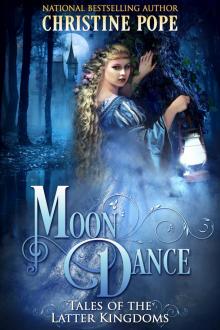 tales of the latter kingdom 08 - moon dance
tales of the latter kingdom 08 - moon dance Stolen and Seduced
Stolen and Seduced Winds of Change
Winds of Change Bad Vibrations: Book 1 of the Sedona Files
Bad Vibrations: Book 1 of the Sedona Files gaian consortium 05 - the titan trap
gaian consortium 05 - the titan trap Unbound Spirits
Unbound Spirits sedona files 05 - falling angels
sedona files 05 - falling angels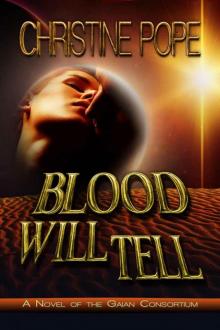 Blood Will Tell
Blood Will Tell Breath of Life
Breath of Life djinn wars 03 - fallen
djinn wars 03 - fallen Unmarked Graves
Unmarked Graves All Fall Down
All Fall Down djinn wars 01 - chosen
djinn wars 01 - chosen Defender (The Witches of Cleopatra Hill Book 11)
Defender (The Witches of Cleopatra Hill Book 11) The Wolf of Harrow Hall (Tales of the Latter Kingdoms Book 7)
The Wolf of Harrow Hall (Tales of the Latter Kingdoms Book 7) sedona files - books one to three
sedona files - books one to three The Arrangement (The Witches of Cleopatra Hill Book 10)
The Arrangement (The Witches of Cleopatra Hill Book 10)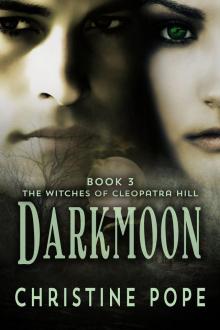 Darkmoon (The Witches of Cleopatra Hill Book 3)
Darkmoon (The Witches of Cleopatra Hill Book 3) Playing With Fire
Playing With Fire djinn wars 02 - taken
djinn wars 02 - taken Falling Dark
Falling Dark witches of cleopatra hill 04.5 - cleopatra hill christmas
witches of cleopatra hill 04.5 - cleopatra hill christmas Deep Magic
Deep Magic witches of cleopatra hill 07 - impractical magic
witches of cleopatra hill 07 - impractical magic Demons & Djinn: Nine Paranormal Romance and Urban Fantasy Novels Featuring Demons, Djinn, and other Bad Boys of the Underworld
Demons & Djinn: Nine Paranormal Romance and Urban Fantasy Novels Featuring Demons, Djinn, and other Bad Boys of the Underworld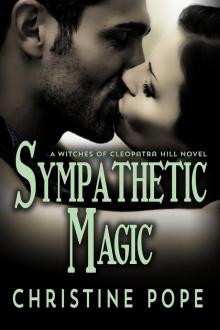 Sympathetic Magic (The Witches of Cleopatra Hill Book 4)
Sympathetic Magic (The Witches of Cleopatra Hill Book 4) Sympathy for the Devil
Sympathy for the Devil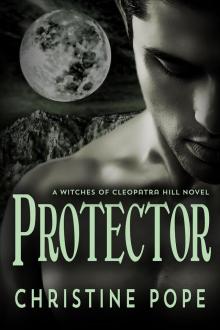 Protector (The Witches of Cleopatra Hill Book 5)
Protector (The Witches of Cleopatra Hill Book 5) Darktide
Darktide Strange Magic (The Witches of Cleopatra Hill Book 9)
Strange Magic (The Witches of Cleopatra Hill Book 9) Forbidden (The Djinn Wars Book 6)
Forbidden (The Djinn Wars Book 6) sedona files 06 - enemy mine
sedona files 06 - enemy mine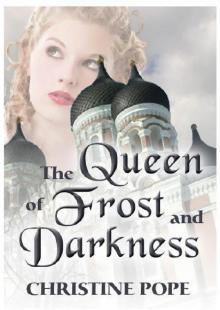 The Queen of Frost and Darkness
The Queen of Frost and Darkness Fringe Benefits
Fringe Benefits Forsaken (The Djinn Wars Book 5)
Forsaken (The Djinn Wars Book 5) Illuminated
Illuminated The Mandala Maneuver
The Mandala Maneuver Deep Magic (The Witches of Cleopatra Hill Book 13)
Deep Magic (The Witches of Cleopatra Hill Book 13) Awoken
Awoken Darkangel (The Witches of Cleopatra Hill)
Darkangel (The Witches of Cleopatra Hill)